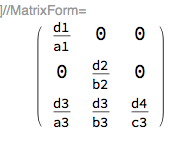I have a set of three polynomials in x and y, and 9 real coefficients a1, b1, ... c3:
poly = {a1 x + b1 y + c1, a2 x + b2 y + c2, a3 x + b3 y + c3}
Is there a built-in Mathematica function that can automatically find a linear transformation (scalings and shifts only) that transformations the polynomials to the form:
poly = {d1 x, d2 y, d3 (x+y)+d4}
where d1, d2, d3, d4 are real numbers independent of x and y. I'm having a lot of trouble with this since using Solve keeps resulting in d4 depending on x and y.
I only need to find one solution to this problem. The reason I would like to automate the solution is because sometimes certain coefficients may be zero (such as a3=0 and b2=0 etc...).

